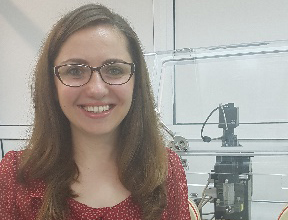
Florina Serdean at her Park XE-70 AFM
Florina is currently a Lecturer PhD at the Department of Mechanical Systems Engineering of the Technical University of Cluj-Napoca (Romania), Faculty of Machine Building. In 2014 she earned her PhD Degree in Industrial Engineering from the Technical University of Cluj-Napoca. Her scientific expertise is in mathematical modelling, simulations, optimizations using metaheuristics for designing reliable resonators and in nano-mechanical and nano-tribological characterization of MEMS.
Florina’s current research project focuses on the nano-characterization of niobium nitride thin films using a XE-70 AFM from Park Systems. The main objective is to investigate the influence of the deposition parameters and the testing conditions on the adhesion force and on the tribological and mechanical properties for this type of thin films.
1.Please summarize the research you do and explain why it is significant?
current research focuses on the nano-characterization of different NEMS/MEMS materials as well as on developing and validating mathematical models based on the experimental results. This characterization obtained by using the Park AFM and the mathematical models combined with the optimization using metaheuristics that we perform, allow us to determine the optimal materials for specific real-world applications. One of the fast-developing industries in the last decades is the NEMS/MEMS industry. Considering the global tendency of manufacturing smaller and smaller devices that encompass all the functionalities of larger ones and due to their small size, NEMS/MEMS devices have been widely used in almost every field. Therefore, specific NEMS/MEMS devices with customized properties are required for each application. Those properties can be determined by performing nano-characterization followed by optimization.
2.How might your research be used?
Any material reduced to nanoscale can have very different properties than the ones at macroscale. An illustrative example is the adhesion, which at nanoscale can easily determine the stiction phenomenon that is the major failure mechanism for NEMS/MEMS structures. Therefore, nano-characterization of materials for NEMS/MEMS devices is essential due to their numerous applications in wireless communications, medical sensors, environments monitoring, military surveillance, etc. The results of our research are required by designers and manufacturers in order to develop reliable NEMS/MEMS devices. The results of our research team from the MiNAS laboratory, from the Technical University of Cluj-Napoca can be found in our published papers (https://minas.utcluj.ro/).
3.Why is the Park AFM important for your research?
Aspects of our research include determining the topography, the tribological and mechanical properties, as well as the adhesion for samples of different materials. Due to the miniaturization tendency, the material characterization has to be performed at nano-scale with an atomic force microscope. The Park AFM is a powerful tool that is invaluable when we want to measure small samples with a great degree of accuracy. The Park AFM also has the great advantage of being modular and can be easily adapted to our needs.
4.What features of Park AFM are the most beneficial and why?
The true Non-Contact mode of Park AFM allows us to determine the exact topography of tiny samples without damaging them. Moreover, the nanoindentation module and the spectroscopy in PinPoint mode of the Park AFM allow us to perform experimental investigations regarding the adhesion and the mechanical and tribological properties, while the data analysis software XEI facilitates through its user-friendly interface the extraction of the needed data from the performed AFM measurements.
